2012年中考英语一轮复习8A Unit1讲解
文档属性
| 名称 | 2012年中考英语一轮复习8A Unit1讲解 |
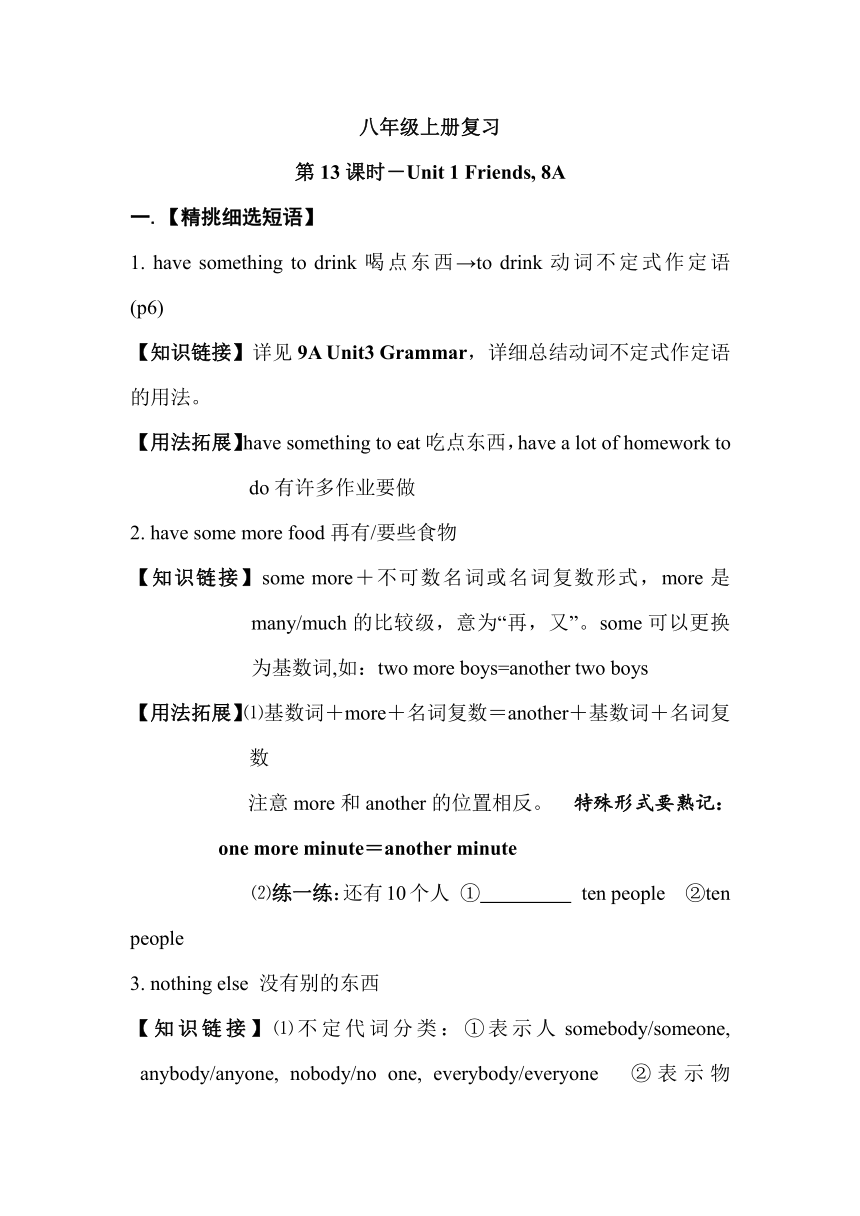
|
|
| 格式 | zip | ||
| 文件大小 | 20.6KB | ||
| 资源类型 | 教案 | ||
| 版本资源 | 通用版 | ||
| 科目 | 英语 | ||
| 更新时间 | 2012-04-24 00:00:00 | ||
图片预览

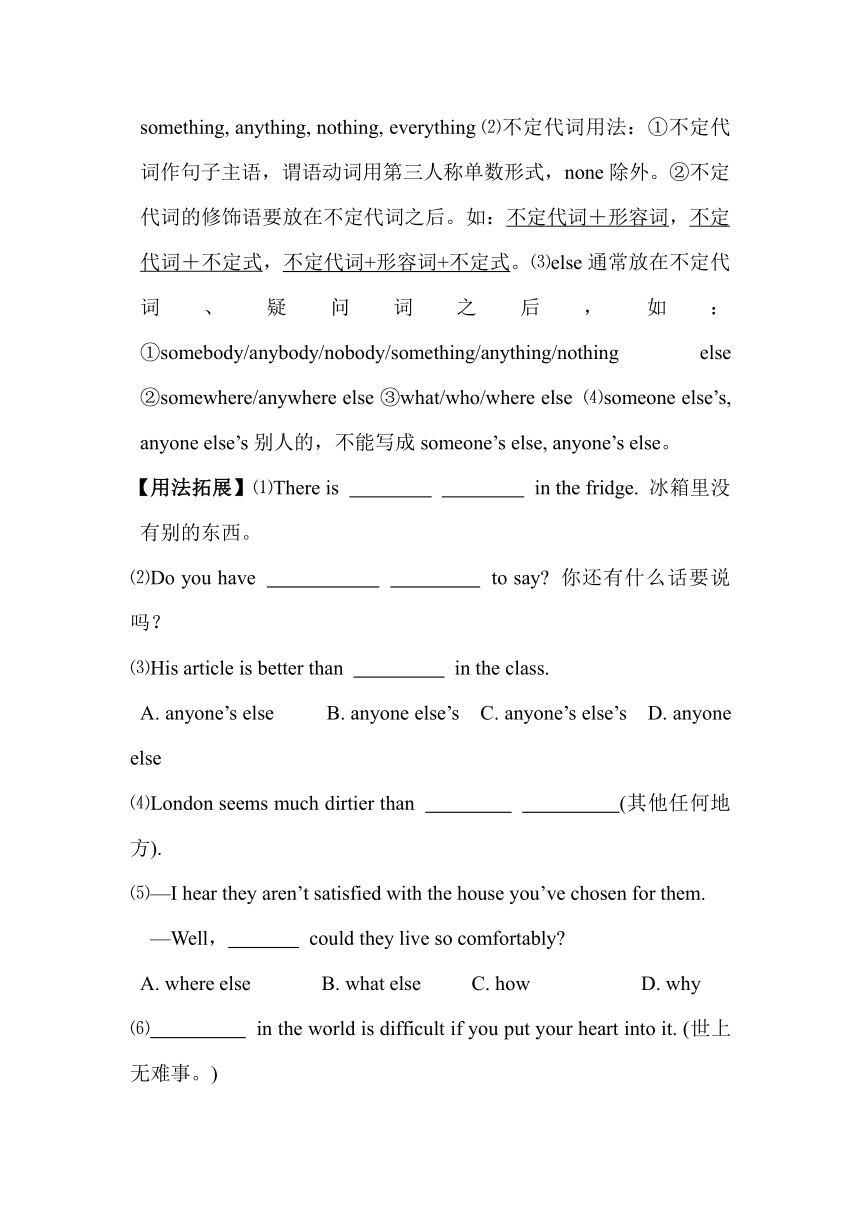
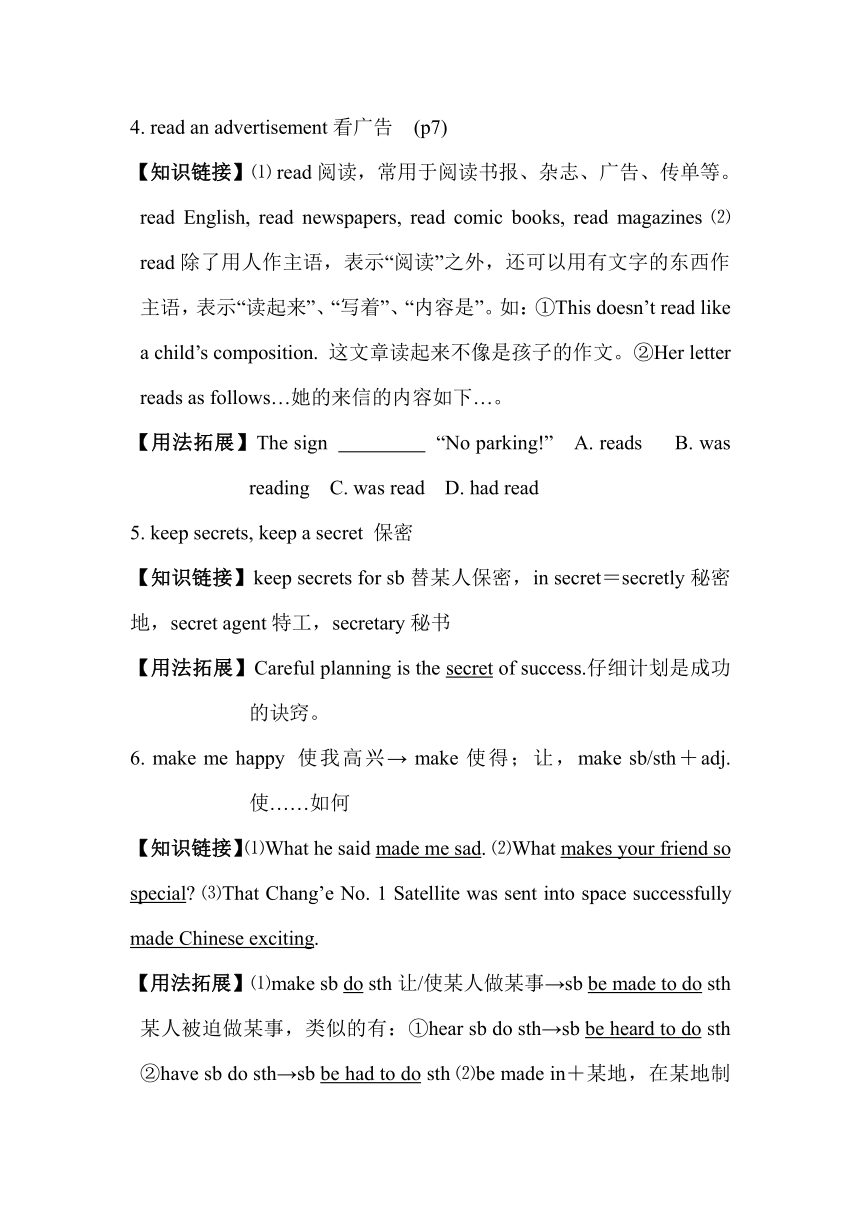
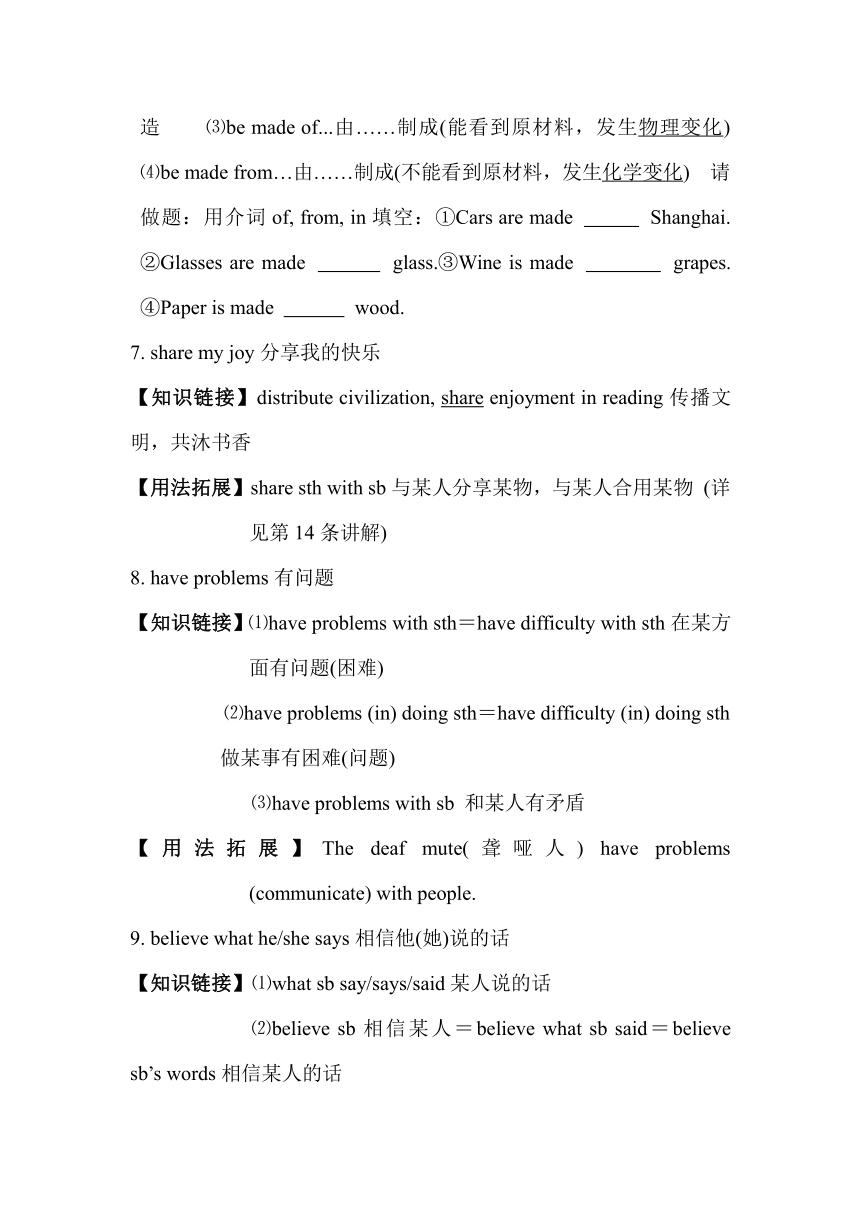
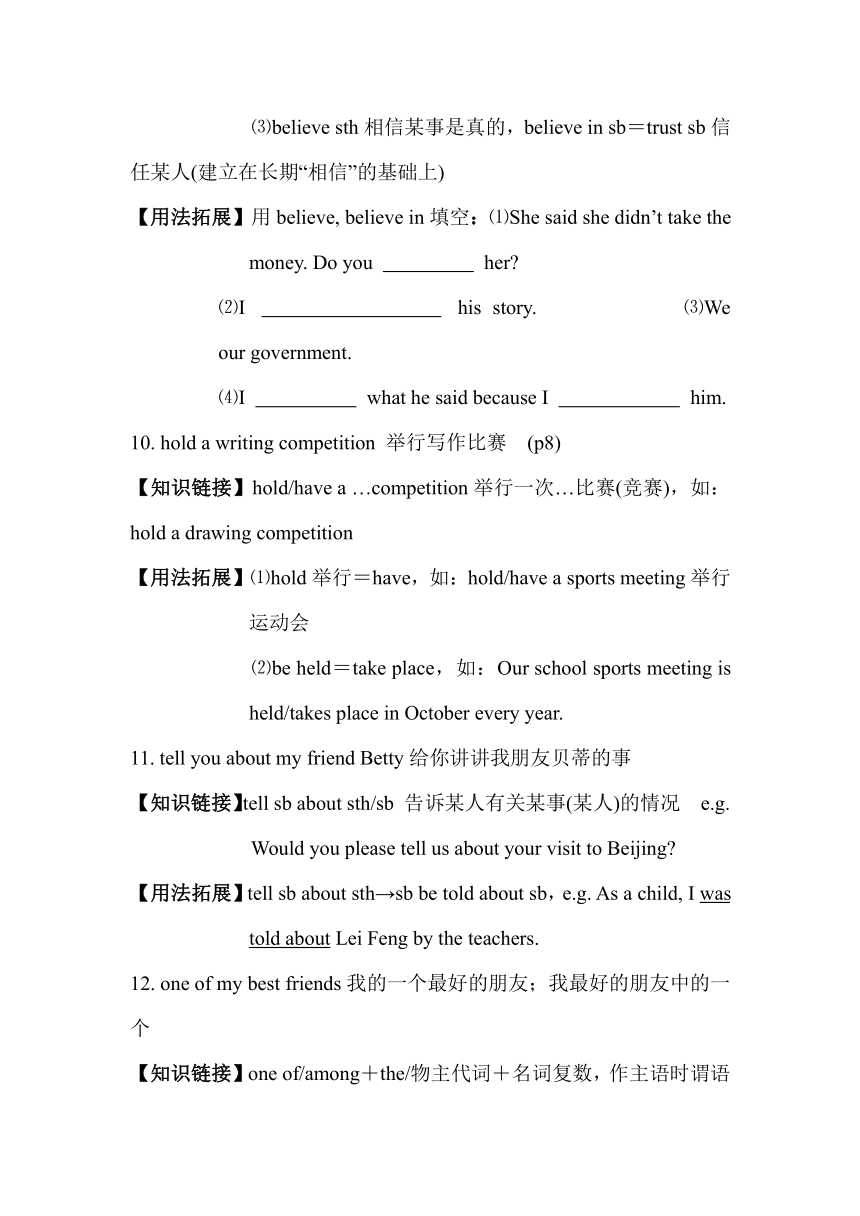
文档简介
八年级上册复习
第13课时-Unit 1 Friends, 8A
一.【精挑细选短语】
1. have something to drink喝点东西→to drink动词不定式作定语 (p6)
【知识链接】详见9A Unit3 Grammar,详细总结动词不定式作定语的用法。
【用法拓展】have something to eat吃点东西,have a lot of homework to do有许多作业要做
2. have some more food再有/要些食物
【知识链接】some more+不可数名词或名词复数形式,more是many/much的比较级,意为“再,又”。some可以更换为基数词,如:two more boys=another two boys
【用法拓展】⑴基数词+more+名词复数=another+基数词+名词复数
注意more和another的位置相反。 特殊形式要熟记:one more minute=another minute
⑵练一练:还有10个人 ① ten people ②ten people
3. nothing else 没有别的东西
【知识链接】⑴不定代词分类:①表示人somebody/someone, anybody/anyone, nobody/no one, everybody/everyone ②表示物something, anything, nothing, everything ⑵不定代词用法:①不定代词作句子主语,谓语动词用第三人称单数形式,none除外。②不定代词的修饰语要放在不定代词之后。如:不定代词+形容词,不定代词+不定式,不定代词+形容词+不定式。⑶else通常放在不定代词、疑问词之后,如:①somebody/anybody/nobody/something/anything/nothing else ②somewhere/anywhere else ③what/who/where else ⑷someone else’s, anyone else’s别人的,不能写成someone’s else, anyone’s else。
【用法拓展】⑴There is in the fridge. 冰箱里没有别的东西。
⑵Do you have to say 你还有什么话要说吗?
⑶His article is better than in the class.
A. anyone’s else B. anyone else’s C. anyone’s else’s D. anyone else
⑷London seems much dirtier than (其他任何地方).
⑸—I hear they aren’t satisfied with the house you’ve chosen for them.
—Well, could they live so comfortably
A. where else B. what else C. how D. why
⑹ in the world is difficult if you put your heart into it. (世上无难事。)
4. read an advertisement看广告 (p7)
【知识链接】⑴ read阅读,常用于阅读书报、杂志、广告、传单等。read English, read newspapers, read comic books, read magazines ⑵ read除了用人作主语,表示“阅读”之外,还可以用有文字的东西作主语,表示“读起来”、“写着”、“内容是”。如:①This doesn’t read like a child’s composition. 这文章读起来不像是孩子的作文。②Her letter reads as follows…她的来信的内容如下…。
【用法拓展】The sign “No parking!” A. reads B. was reading C. was read D. had read
5. keep secrets, keep a secret 保密
【知识链接】keep secrets for sb替某人保密,in secret=secretly秘密地,secret agent特工,secretary秘书
【用法拓展】Careful planning is the secret of success.仔细计划是成功的诀窍。
6. make me happy 使我高兴→ make使得;让,make sb/sth+adj. 使……如何
【知识链接】⑴What he said made me sad. ⑵What makes your friend so special ⑶That Chang’e No. 1 Satellite was sent into space successfully made Chinese exciting.
【用法拓展】⑴make sb do sth让/使某人做某事→sb be made to do sth某人被迫做某事,类似的有:①hear sb do sth→sb be heard to do sth ②have sb do sth→sb be had to do sth ⑵be made in+某地,在某地制造 ⑶be made of...由……制成(能看到原材料,发生物理变化) ⑷be made from…由……制成(不能看到原材料,发生化学变化) 请做题:用介词of, from, in填空:①Cars are made Shanghai. ②Glasses are made glass.③Wine is made grapes. ④Paper is made wood.
7. share my joy分享我的快乐
【知识链接】distribute civilization, share enjoyment in reading传播文明,共沐书香
【用法拓展】share sth with sb与某人分享某物,与某人合用某物 (详见第14条讲解)
8. have problems有问题
【知识链接】⑴have problems with sth=have difficulty with sth在某方面有问题(困难)
⑵have problems (in) doing sth=have difficulty (in) doing sth做某事有困难(问题)
⑶have problems with sb 和某人有矛盾
【用法拓展】The deaf mute(聋哑人) have problems (communicate) with people.
9. believe what he/she says相信他(她)说的话
【知识链接】⑴what sb say/says/said某人说的话
⑵believe sb相信某人=believe what sb said=believe sb’s words相信某人的话
⑶believe sth相信某事是真的,believe in sb=trust sb信任某人(建立在长期“相信”的基础上)
【用法拓展】用believe, believe in填空:⑴She said she didn’t take the money. Do you her
⑵I his story. ⑶We our government.
⑷I what he said because I him.
10. hold a writing competition 举行写作比赛 (p8)
【知识链接】hold/have a …competition举行一次…比赛(竞赛),如:hold a drawing competition
【用法拓展】⑴hold举行=have,如:hold/have a sports meeting举行运动会
⑵be held=take place,如:Our school sports meeting is held/takes place in October every year.
11. tell you about my friend Betty给你讲讲我朋友贝蒂的事
【知识链接】tell sb about sth/sb 告诉某人有关某事(某人)的情况 e.g.
Would you please tell us about your visit to Beijing
【用法拓展】tell sb about sth→sb be told about sb,e.g. As a child, I was told about Lei Feng by the teachers.
12. one of my best friends我的一个最好的朋友;我最好的朋友中的一个
【知识链接】one of/among+the/物主代词+名词复数,作主语时谓语用单数,“最……中的一个”。
【用法拓展】The Changjiang River is one of/among (long) rivers in the world.
13. be willing to do sth 乐意(愿意)做某事
【知识链接】willing乐意的;愿意的→unwilling不情愿的→willingly愿意地→willingness n.心甘情愿
【用法拓展】I’m quite willing to do anything for you. 我非常愿意为你做任何事情。
14. share sth with sb 与某人分享某物,与某人合用某物
【知识链接】share vt.分配,均分;共有,共用 e.g.①The boy shared the cake equally. 这男孩平均分配蛋糕。
②I shared my lunch with him. 我和他分享我的午餐。③Lucy shares a bedroom with Lily.
15. be ready to do sth 愿意做某事
【知识链接】ready ⑴准备好的,e.g. Come on, dinner’s ready! 快过来,饭好了!
⑵愿意的,e.g. He’s always ready to help his friends.他总是乐意帮助朋友。
【用法拓展】⑴be ready for sth, get ready for sth准备好某事;为某事做好准备 e.g. Can you help me get everything ready for the party 你能不能帮我把这次聚会准备妥当?⑵get ready to do sth准备好做某事,be ready to do sth乐意做某事;准备好做某事,e.g.Volunteers were ready and waiting to pack the food in boxes.志愿者们已准备完毕,等着将食物装箱。⑶Ready, steady, go! (比赛口令)各就位-预备-跑!
16. on the bus在公交车上,give seats to someone in need把座位让给需要的人
【知识链接】⑴on the bus/train/plane在公交车/火车/飞机上,in the boat/ship在小船/轮船上 ⑵give seats to sb给某人让座 ⑶in need需要帮助的,常做后置定语。e.g. children in need需要帮助的孩子
17. travel around the world周游(环游)世界 ,grow up长大
【知识链接】⑴travel/go/move/turn around… 围绕…运转 e.g. The earth travels around the sun.
⑵What do you want to be when you (长大)
18. get to do sth有机会做某事→get to do sth表示“有机会做某事”,常用于口语。
【知识链接】They got to know each other ten years ago.他们十年前认识对方的。
【用法拓展】have got to do sth=have to do sth不得不,必须。e.g. It’s getting dark. We’ve got to go.
19. a wonderful friend called Max一个叫马克斯的出色的朋友
【知识链接】…called/named…“一个叫…的…”过去分词短语作后置定语修饰名词,e.g.①a boy called/named Tom一个叫汤姆的男孩 ②a game called/named hide-and-seek一个叫捉迷藏的游戏
20. have poor eyesight 视力差,because of… 因为… , work on…操作…
〈原文再现〉However, he has poor eyesight because of working on the computer too much at night.
然而,因为他晚上用电脑太多,所以视力差。
【知识链接】⑴however副词,常用于句首,与后面的句子用“逗号”隔开。but连词,连接两个简单句,构成并列句。用however, but填空:
① , things have changed.
②He is very young, he knows a lot.
⑵because of 是复合介词,because of+名词/代词/动名词;because是连词,because后接状语从句,不能接名词、代词或动名词。
【用法拓展】用because, because of填空:
①We stayed at home the rain.
②I can’t go I am ill.
③She was regarded as a heroine she lost his life for her country.
④You’d better wear sunglasses eye protection is necessary on sunny days.
21. make him look smart 使他看上去很帅气 (详见第6条【用法拓展】⑴)
22. have a good sense of humour=be humorous很有幽默感
【知识链接】five senses五种感觉:sight视觉, hearing听觉, smell嗅觉, taste味觉, touch触觉。第六感是the sixth tense。
23. knock our books and pens off the desks把我们的书和钢笔从课桌上碰掉→knock. sth off…
【用法拓展】⑴knock sth over撞翻⑵knock sb down撞倒某人⑶knock on/at the door/window敲门/窗
24. think of my good friend想起我的好朋友
【知识链接】think of…想到;想起;想出;(用进行时表示)想做…… e.g. ⑴It’s good to think of the future. 想想未来是件好事。⑵She often thinks of her home. 她常常想起她的家。⑶He thought of a good plan.他想出一个好计划。⑷I’m thinking of buying a piano.我想着/正想买一架钢琴。
【用法拓展】⑴think about…思考(动词+介词) e.g. She’s thinking about what to say.
⑵think…over仔细考虑(动词+副词) e.g. I’ll give you three days to think it over.
25. have straight, shoulder-length hair留着直的齐肩的头发
【知识链接】注意以下形容词与名词的转换:①long长的→length长度 ②high高的→height高度 ③wide宽的→width宽度 ④deep深的→depth深度 ⑤strong强壮的→strength力量
26. a true friend一个忠实的朋友
【知识链接】⑴true真实的;忠实的→反义词false错误的,truth真相、事实,truly真正地 e.g. He is true to his friends.他对朋友们忠诚。⑵real实际的;真的,reality现实,really真地 e.g. The story was taken from real life. 这故事取材于现实生活。
【用法拓展】come true实现 (注意:该短语中不能使用truly) e.g. His dream has come true.
27. say a bad word about sb说某人的坏话
28. be generous to sb对某人慷慨 (p10)
29. do a lot of computer work做许多计算机方面的工作
30. be very good at doing sth十分擅长做某事;很会做某事,tell jokes讲笑话→tell sb jokes
31. tell others her friends’ secrets告诉别人她朋友们的秘密
32. vote for…投票选出,投票赞成 →vote for the best friend,vote online for the best singer
33. have an English test进行一次英语测验 (p14)
34. hold/have a drawing competition举行一次绘画比赛,in the drawing competition
35. go hiking去远足→go+v-ing (p15)
【知识链接】go swimming/camping/cycling/diving/skiing去游泳/野营/骑车/潜水/滑雪
36. try to be kind to people 尽力对人们友善,try my best to help them尽力帮助他们 (p16)
【知识链接】try to do sth试图做,try doing sth试着做,try/do one’s best to do sth尽力做
37. a social worker社会工作者;社工
38. the fastest runner跑步最快的人 (p17)
39. have some problems with my new school (p18)
【知识链接】have problems with sth在…有困难,have problems (in) doing sth 做某事有困难e.g. I didn’t have any problem (in) finding his home.
40. know…very well=know a lot/much about… 对……很了解
41. feel really uncomfortable真地感到不舒服
42. sit alone in/on the playground一个人坐在操场上
43. miss my old friends very much 非常想念我的老朋友
【知识链接】miss想念;错过,e.g. He ran very fast in order not to miss the early bus.
44. what to do 做什么,疑问词+动词不定式,注意区别:how to do it(怎样做这件事)
45. give me some advice给我提一些建议
【知识链接】⑴give/offer sb some advice/suggestions给某人提一些建议(以下短语可用offer,suggestions) ⑵give sb some advice on sth给某人提有关某事的建议
⑶give sb some advice on how to do sth就如何做某事给某人提建议
46. both my best friend and my neighbour既是我最好的朋友又是我的邻居 (p20)
【知识链接】⑴both…and… …和…(两者)都 ⑵both of… 两者都…
【用法拓展】⑴neither…nor… …和…(两者)都不
⑵neither of… 两者都不 ⑶not only…but also… 不但…而且…
⑷either of… 两者中的一个
⑸either…or… 或者…或者…
⑹all of… (两者以上)都
⑺none of… (两者以上)都不
47. wear a smile on one’s face面带微笑
48. tell me funny jokes给我讲有趣的笑话
【知识链接】play a joke on sb 开某人的玩笑,e.g. Don’t play jokes on the disabled. It’s impolite.
49. have a friend like Alan有个像艾伦一样的朋友 (p21)
50. answer questions correctly回答问题正确
二.【百里挑一词汇】
1. honest诚实的,honesty诚实,dishonest不诚实的,an honest boy (注意honest前用不定冠词an)
2. bored无聊的(主语是人),boring无聊的(主语是事物),e.g. This programme is boring, so I feel bored.
3. future plans未来计划,in the future在将来;未来,in future=from now on从今以后
4. dangerous危险的→danger危险,safe安全的→safely adv.安全地→safety n.安全,in danger处于危险中
5. exciting令人兴奋的;扣人心弦的→excited兴奋的→excitedly adv.兴奋地=with excitement→excitement n.兴奋,e.g. We were excited at the exciting news.
三.【五星必背句型】
1. I hope to become a famous singer and travel around the world in the future. (p17)
【知识链接】Sb hope(s) to do sth.某人希望做某事。注意没有hope sb to do sth,需转化为hope that从句。
2. What about… =How about… …怎么样 →What/How about sth/doing sth (做)某事如何?
【知识链接】Why don’t you do sth?=Why not do sth 为何不做某事?(提建议用语)
四.【中考无敌语法】连系动词+形容词、形容词的比较等级
㈠用形容词描述事物
⒈人们用形容词来描述人或物,大多数形容词可置于名词前或连系动词之后;但有些形容词只能用在系动词之后作表语,如:alone, asleep, awake, ill等。e.g.
⑴She has short hair.=Her hair is short.
⑵A lazy cat is sleeping on the sofa. The cat is lazy.
⑶The man is ill. (不能说an ill man)
⑷He stayed at home alone.
⒉常见的连系动词有:
be, become, feel, get, grow, keep, look, seem, smell, sound, taste, turn…,e.g.
become rich, feel unhappy, get angry/hungry/cold/hot/warm/cool/long/short(get+冷热暖凉长短)
grow old/impatient, keep fit, look nice, seem worried, smell sweet, sound great, taste sour(酸),
turn red/green/yellow/pale (turn+颜色), go bad变质, go mad发疯, go missing丢失, go wrong走错路
注意:get/grow/become“变成”在大多情况下用法相似。
㈡形容词的比较等级
〈基本用法〉形容词的比较分为三个等级,即:原级、比较级和最高级。两者之间的比较用比较级,两者以上的比较用最高级。
〈常用句式〉
⒈ A+动词+as+原级+as+B(+动词). 表示A和B同等程度。e.g.
①She is as slim as I (am).
②Swimming is as interesting as diving.
【注意】so/quite/very/too+形容词原级。
⒉ A+动词的否定式+as/so+原级+as+B(+动词). 在某方面A不如B,即not as/so…as…
①She is not as slim as I (am).
②Swimming isn’t as interesting as diving.
⒊⑴A+动词+比较级+than+B(+动词). 表示A超过B。
①He is taller than I (am).
②English is more useful than Japanese.
⑵A+动词+the+比较级+of the two…. 两者中较……的一个
①The red sweater is the cheaper one of the two.
②Shirley is the shorter of the two girls.
【注意】much/a lot/even/far+形容词比较级,a little/a bit+原级或比较级。
⑶the+比较级…, the+比较级…, 表示B随着A的增长程度而平行增长,译为“越…越…”。
①The lazier you are, the poorer you will be.
②The more careful you are, the fewer mistakes you will make.
⑷①比较级and比较级,more and more+多音节形容词原级,表示“越来越……” e.g.
The spring is coming, it is getting warmer and warmer. Our city is becoming more and more beautiful.
②more and more+不可数名词或名词复数,表示“越来越多的……” e.g.
More and more students are using the Internet and they spend more and more time on it.
③much more+不可数名词,many more+名词复数,表示“多得多的…” e.g.
I have much more milk than she. Our school has many more students than theirs.
⑸表示“×××是×××的倍数”时用“A+动词+倍数+as+原级+as+B(+动词).” e.g.
This desk is twice as wide as that one. 这张桌子是那张桌子的两倍宽。
⑹表示“×××比×××大…倍”时用“A+动词+倍数+比较级+than+B.” e.g.
Asia is three times larger than Europe.亚洲比欧洲大三倍。
⒋⑴A+动词+the+最高级+名词单数+of/in/among…(比较的范围). ×××中最…的一个。
①Tom is the cleverest student in his class.
②The Changjiang River is among the longest rivers in the world. (注意:此时among=one of)
⑵形容词最高级前若有物主代词或名词所有格,不能再加the。She is doubtless my best friend.
⒌the second/third/fourth/fifth/…+不带the的最高级+名词单数,第二/第三/第四/第五个…最…的。e.g. Hainan Island is the second largest island in China. 海南岛是中国第二大岛屿。
〈词形变化〉形容词比较级、最高级的构成
级 别 变化规则 原 级 比较级 最高级
规则变化 大多数单音节词+er/est dark darker darkest
以e结尾的单音节词+r/st nice nicer nicest
以辅音字母+y结尾的词-y+ier/est pretty prettier prettiest
重读闭音节词双写末尾字母+er/est slim slimmer slimmest
少数双音节词、所有多音节词, more/most+该词 beautiful more beautiful most beautiful
不规则变化 不规则的形容词代替该词 good better best
【特殊形式】
⒈双写末尾字母再加er/est的有9个:big, fat, hot, red, wet, glad, sad, slim, thin
【巧记】“大”“胖”子“热”得脸通“红”,浑身“湿”透,“高兴”不起来,太“难过”了,真不如“苗条”的“瘦”子。
⒉少数双音节形容词,特别是以ful结尾的词、分词形容词的比较等级,一律在该词前加more/most,常见的有:useful, helpful, careful, nervous, tired, tiring, often。
⒊常见的不规则形容词、副词:
原级 比较级 最高级 词义 备注
good, well better best 好 well adj.健康的 adv.好
bad, ill, badly worse worst 坏、病 badly坏地;糟糕地;严重地;迫切地
many, much more most 多 more/most+比较级/最高级
little less least 少 little小的, 与small相似。
far fartherfurther farthest, furthest 远 farther, farthest只指距离,“更远、较远”;further, furthest用处较广,又与抽象名词连用指,指程度更深远,“另外的,更多的”。
old older elder oldesteldest 大 older, oldest指人和物,older than;elder, eldest仅指人,作定语。
【同义转换】
1.A+动词的否定式+as/so+形容词原级+as+B(+动词).
同义转换为:B+动词+形容词比较级+than+A(+动词) e.g.
①She is not as clever as I am.=I am cleverer than she.
②Tom is not as tall as Simon.=Simon is taller than Tom.=Tom is shorter than Simon.
2.“形容词比较级+than any other+名词单数” 或“形容词比较级+than any of the other+名词复数”
同义转换为“the+形容词最高级(+名词单数)”. e.g.
Shanghai is larger than any other city in China.
=Shanghai is the largest city in China.
=Shanghai is larger than any of the other cities in China.
第13课时-Unit 1 Friends, 8A
一.【精挑细选短语】
1. have something to drink喝点东西→to drink动词不定式作定语 (p6)
【知识链接】详见9A Unit3 Grammar,详细总结动词不定式作定语的用法。
【用法拓展】have something to eat吃点东西,have a lot of homework to do有许多作业要做
2. have some more food再有/要些食物
【知识链接】some more+不可数名词或名词复数形式,more是many/much的比较级,意为“再,又”。some可以更换为基数词,如:two more boys=another two boys
【用法拓展】⑴基数词+more+名词复数=another+基数词+名词复数
注意more和another的位置相反。 特殊形式要熟记:one more minute=another minute
⑵练一练:还有10个人 ① ten people ②ten people
3. nothing else 没有别的东西
【知识链接】⑴不定代词分类:①表示人somebody/someone, anybody/anyone, nobody/no one, everybody/everyone ②表示物something, anything, nothing, everything ⑵不定代词用法:①不定代词作句子主语,谓语动词用第三人称单数形式,none除外。②不定代词的修饰语要放在不定代词之后。如:不定代词+形容词,不定代词+不定式,不定代词+形容词+不定式。⑶else通常放在不定代词、疑问词之后,如:①somebody/anybody/nobody/something/anything/nothing else ②somewhere/anywhere else ③what/who/where else ⑷someone else’s, anyone else’s别人的,不能写成someone’s else, anyone’s else。
【用法拓展】⑴There is in the fridge. 冰箱里没有别的东西。
⑵Do you have to say 你还有什么话要说吗?
⑶His article is better than in the class.
A. anyone’s else B. anyone else’s C. anyone’s else’s D. anyone else
⑷London seems much dirtier than (其他任何地方).
⑸—I hear they aren’t satisfied with the house you’ve chosen for them.
—Well, could they live so comfortably
A. where else B. what else C. how D. why
⑹ in the world is difficult if you put your heart into it. (世上无难事。)
4. read an advertisement看广告 (p7)
【知识链接】⑴ read阅读,常用于阅读书报、杂志、广告、传单等。read English, read newspapers, read comic books, read magazines ⑵ read除了用人作主语,表示“阅读”之外,还可以用有文字的东西作主语,表示“读起来”、“写着”、“内容是”。如:①This doesn’t read like a child’s composition. 这文章读起来不像是孩子的作文。②Her letter reads as follows…她的来信的内容如下…。
【用法拓展】The sign “No parking!” A. reads B. was reading C. was read D. had read
5. keep secrets, keep a secret 保密
【知识链接】keep secrets for sb替某人保密,in secret=secretly秘密地,secret agent特工,secretary秘书
【用法拓展】Careful planning is the secret of success.仔细计划是成功的诀窍。
6. make me happy 使我高兴→ make使得;让,make sb/sth+adj. 使……如何
【知识链接】⑴What he said made me sad. ⑵What makes your friend so special ⑶That Chang’e No. 1 Satellite was sent into space successfully made Chinese exciting.
【用法拓展】⑴make sb do sth让/使某人做某事→sb be made to do sth某人被迫做某事,类似的有:①hear sb do sth→sb be heard to do sth ②have sb do sth→sb be had to do sth ⑵be made in+某地,在某地制造 ⑶be made of...由……制成(能看到原材料,发生物理变化) ⑷be made from…由……制成(不能看到原材料,发生化学变化) 请做题:用介词of, from, in填空:①Cars are made Shanghai. ②Glasses are made glass.③Wine is made grapes. ④Paper is made wood.
7. share my joy分享我的快乐
【知识链接】distribute civilization, share enjoyment in reading传播文明,共沐书香
【用法拓展】share sth with sb与某人分享某物,与某人合用某物 (详见第14条讲解)
8. have problems有问题
【知识链接】⑴have problems with sth=have difficulty with sth在某方面有问题(困难)
⑵have problems (in) doing sth=have difficulty (in) doing sth做某事有困难(问题)
⑶have problems with sb 和某人有矛盾
【用法拓展】The deaf mute(聋哑人) have problems (communicate) with people.
9. believe what he/she says相信他(她)说的话
【知识链接】⑴what sb say/says/said某人说的话
⑵believe sb相信某人=believe what sb said=believe sb’s words相信某人的话
⑶believe sth相信某事是真的,believe in sb=trust sb信任某人(建立在长期“相信”的基础上)
【用法拓展】用believe, believe in填空:⑴She said she didn’t take the money. Do you her
⑵I his story. ⑶We our government.
⑷I what he said because I him.
10. hold a writing competition 举行写作比赛 (p8)
【知识链接】hold/have a …competition举行一次…比赛(竞赛),如:hold a drawing competition
【用法拓展】⑴hold举行=have,如:hold/have a sports meeting举行运动会
⑵be held=take place,如:Our school sports meeting is held/takes place in October every year.
11. tell you about my friend Betty给你讲讲我朋友贝蒂的事
【知识链接】tell sb about sth/sb 告诉某人有关某事(某人)的情况 e.g.
Would you please tell us about your visit to Beijing
【用法拓展】tell sb about sth→sb be told about sb,e.g. As a child, I was told about Lei Feng by the teachers.
12. one of my best friends我的一个最好的朋友;我最好的朋友中的一个
【知识链接】one of/among+the/物主代词+名词复数,作主语时谓语用单数,“最……中的一个”。
【用法拓展】The Changjiang River is one of/among (long) rivers in the world.
13. be willing to do sth 乐意(愿意)做某事
【知识链接】willing乐意的;愿意的→unwilling不情愿的→willingly愿意地→willingness n.心甘情愿
【用法拓展】I’m quite willing to do anything for you. 我非常愿意为你做任何事情。
14. share sth with sb 与某人分享某物,与某人合用某物
【知识链接】share vt.分配,均分;共有,共用 e.g.①The boy shared the cake equally. 这男孩平均分配蛋糕。
②I shared my lunch with him. 我和他分享我的午餐。③Lucy shares a bedroom with Lily.
15. be ready to do sth 愿意做某事
【知识链接】ready ⑴准备好的,e.g. Come on, dinner’s ready! 快过来,饭好了!
⑵愿意的,e.g. He’s always ready to help his friends.他总是乐意帮助朋友。
【用法拓展】⑴be ready for sth, get ready for sth准备好某事;为某事做好准备 e.g. Can you help me get everything ready for the party 你能不能帮我把这次聚会准备妥当?⑵get ready to do sth准备好做某事,be ready to do sth乐意做某事;准备好做某事,e.g.Volunteers were ready and waiting to pack the food in boxes.志愿者们已准备完毕,等着将食物装箱。⑶Ready, steady, go! (比赛口令)各就位-预备-跑!
16. on the bus在公交车上,give seats to someone in need把座位让给需要的人
【知识链接】⑴on the bus/train/plane在公交车/火车/飞机上,in the boat/ship在小船/轮船上 ⑵give seats to sb给某人让座 ⑶in need需要帮助的,常做后置定语。e.g. children in need需要帮助的孩子
17. travel around the world周游(环游)世界 ,grow up长大
【知识链接】⑴travel/go/move/turn around… 围绕…运转 e.g. The earth travels around the sun.
⑵What do you want to be when you (长大)
18. get to do sth有机会做某事→get to do sth表示“有机会做某事”,常用于口语。
【知识链接】They got to know each other ten years ago.他们十年前认识对方的。
【用法拓展】have got to do sth=have to do sth不得不,必须。e.g. It’s getting dark. We’ve got to go.
19. a wonderful friend called Max一个叫马克斯的出色的朋友
【知识链接】…called/named…“一个叫…的…”过去分词短语作后置定语修饰名词,e.g.①a boy called/named Tom一个叫汤姆的男孩 ②a game called/named hide-and-seek一个叫捉迷藏的游戏
20. have poor eyesight 视力差,because of… 因为… , work on…操作…
〈原文再现〉However, he has poor eyesight because of working on the computer too much at night.
然而,因为他晚上用电脑太多,所以视力差。
【知识链接】⑴however副词,常用于句首,与后面的句子用“逗号”隔开。but连词,连接两个简单句,构成并列句。用however, but填空:
① , things have changed.
②He is very young, he knows a lot.
⑵because of 是复合介词,because of+名词/代词/动名词;because是连词,because后接状语从句,不能接名词、代词或动名词。
【用法拓展】用because, because of填空:
①We stayed at home the rain.
②I can’t go I am ill.
③She was regarded as a heroine she lost his life for her country.
④You’d better wear sunglasses eye protection is necessary on sunny days.
21. make him look smart 使他看上去很帅气 (详见第6条【用法拓展】⑴)
22. have a good sense of humour=be humorous很有幽默感
【知识链接】five senses五种感觉:sight视觉, hearing听觉, smell嗅觉, taste味觉, touch触觉。第六感是the sixth tense。
23. knock our books and pens off the desks把我们的书和钢笔从课桌上碰掉→knock. sth off…
【用法拓展】⑴knock sth over撞翻⑵knock sb down撞倒某人⑶knock on/at the door/window敲门/窗
24. think of my good friend想起我的好朋友
【知识链接】think of…想到;想起;想出;(用进行时表示)想做…… e.g. ⑴It’s good to think of the future. 想想未来是件好事。⑵She often thinks of her home. 她常常想起她的家。⑶He thought of a good plan.他想出一个好计划。⑷I’m thinking of buying a piano.我想着/正想买一架钢琴。
【用法拓展】⑴think about…思考(动词+介词) e.g. She’s thinking about what to say.
⑵think…over仔细考虑(动词+副词) e.g. I’ll give you three days to think it over.
25. have straight, shoulder-length hair留着直的齐肩的头发
【知识链接】注意以下形容词与名词的转换:①long长的→length长度 ②high高的→height高度 ③wide宽的→width宽度 ④deep深的→depth深度 ⑤strong强壮的→strength力量
26. a true friend一个忠实的朋友
【知识链接】⑴true真实的;忠实的→反义词false错误的,truth真相、事实,truly真正地 e.g. He is true to his friends.他对朋友们忠诚。⑵real实际的;真的,reality现实,really真地 e.g. The story was taken from real life. 这故事取材于现实生活。
【用法拓展】come true实现 (注意:该短语中不能使用truly) e.g. His dream has come true.
27. say a bad word about sb说某人的坏话
28. be generous to sb对某人慷慨 (p10)
29. do a lot of computer work做许多计算机方面的工作
30. be very good at doing sth十分擅长做某事;很会做某事,tell jokes讲笑话→tell sb jokes
31. tell others her friends’ secrets告诉别人她朋友们的秘密
32. vote for…投票选出,投票赞成 →vote for the best friend,vote online for the best singer
33. have an English test进行一次英语测验 (p14)
34. hold/have a drawing competition举行一次绘画比赛,in the drawing competition
35. go hiking去远足→go+v-ing (p15)
【知识链接】go swimming/camping/cycling/diving/skiing去游泳/野营/骑车/潜水/滑雪
36. try to be kind to people 尽力对人们友善,try my best to help them尽力帮助他们 (p16)
【知识链接】try to do sth试图做,try doing sth试着做,try/do one’s best to do sth尽力做
37. a social worker社会工作者;社工
38. the fastest runner跑步最快的人 (p17)
39. have some problems with my new school (p18)
【知识链接】have problems with sth在…有困难,have problems (in) doing sth 做某事有困难e.g. I didn’t have any problem (in) finding his home.
40. know…very well=know a lot/much about… 对……很了解
41. feel really uncomfortable真地感到不舒服
42. sit alone in/on the playground一个人坐在操场上
43. miss my old friends very much 非常想念我的老朋友
【知识链接】miss想念;错过,e.g. He ran very fast in order not to miss the early bus.
44. what to do 做什么,疑问词+动词不定式,注意区别:how to do it(怎样做这件事)
45. give me some advice给我提一些建议
【知识链接】⑴give/offer sb some advice/suggestions给某人提一些建议(以下短语可用offer,suggestions) ⑵give sb some advice on sth给某人提有关某事的建议
⑶give sb some advice on how to do sth就如何做某事给某人提建议
46. both my best friend and my neighbour既是我最好的朋友又是我的邻居 (p20)
【知识链接】⑴both…and… …和…(两者)都 ⑵both of… 两者都…
【用法拓展】⑴neither…nor… …和…(两者)都不
⑵neither of… 两者都不 ⑶not only…but also… 不但…而且…
⑷either of… 两者中的一个
⑸either…or… 或者…或者…
⑹all of… (两者以上)都
⑺none of… (两者以上)都不
47. wear a smile on one’s face面带微笑
48. tell me funny jokes给我讲有趣的笑话
【知识链接】play a joke on sb 开某人的玩笑,e.g. Don’t play jokes on the disabled. It’s impolite.
49. have a friend like Alan有个像艾伦一样的朋友 (p21)
50. answer questions correctly回答问题正确
二.【百里挑一词汇】
1. honest诚实的,honesty诚实,dishonest不诚实的,an honest boy (注意honest前用不定冠词an)
2. bored无聊的(主语是人),boring无聊的(主语是事物),e.g. This programme is boring, so I feel bored.
3. future plans未来计划,in the future在将来;未来,in future=from now on从今以后
4. dangerous危险的→danger危险,safe安全的→safely adv.安全地→safety n.安全,in danger处于危险中
5. exciting令人兴奋的;扣人心弦的→excited兴奋的→excitedly adv.兴奋地=with excitement→excitement n.兴奋,e.g. We were excited at the exciting news.
三.【五星必背句型】
1. I hope to become a famous singer and travel around the world in the future. (p17)
【知识链接】Sb hope(s) to do sth.某人希望做某事。注意没有hope sb to do sth,需转化为hope that从句。
2. What about… =How about… …怎么样 →What/How about sth/doing sth (做)某事如何?
【知识链接】Why don’t you do sth?=Why not do sth 为何不做某事?(提建议用语)
四.【中考无敌语法】连系动词+形容词、形容词的比较等级
㈠用形容词描述事物
⒈人们用形容词来描述人或物,大多数形容词可置于名词前或连系动词之后;但有些形容词只能用在系动词之后作表语,如:alone, asleep, awake, ill等。e.g.
⑴She has short hair.=Her hair is short.
⑵A lazy cat is sleeping on the sofa. The cat is lazy.
⑶The man is ill. (不能说an ill man)
⑷He stayed at home alone.
⒉常见的连系动词有:
be, become, feel, get, grow, keep, look, seem, smell, sound, taste, turn…,e.g.
become rich, feel unhappy, get angry/hungry/cold/hot/warm/cool/long/short(get+冷热暖凉长短)
grow old/impatient, keep fit, look nice, seem worried, smell sweet, sound great, taste sour(酸),
turn red/green/yellow/pale (turn+颜色), go bad变质, go mad发疯, go missing丢失, go wrong走错路
注意:get/grow/become“变成”在大多情况下用法相似。
㈡形容词的比较等级
〈基本用法〉形容词的比较分为三个等级,即:原级、比较级和最高级。两者之间的比较用比较级,两者以上的比较用最高级。
〈常用句式〉
⒈ A+动词+as+原级+as+B(+动词). 表示A和B同等程度。e.g.
①She is as slim as I (am).
②Swimming is as interesting as diving.
【注意】so/quite/very/too+形容词原级。
⒉ A+动词的否定式+as/so+原级+as+B(+动词). 在某方面A不如B,即not as/so…as…
①She is not as slim as I (am).
②Swimming isn’t as interesting as diving.
⒊⑴A+动词+比较级+than+B(+动词). 表示A超过B。
①He is taller than I (am).
②English is more useful than Japanese.
⑵A+动词+the+比较级+of the two…. 两者中较……的一个
①The red sweater is the cheaper one of the two.
②Shirley is the shorter of the two girls.
【注意】much/a lot/even/far+形容词比较级,a little/a bit+原级或比较级。
⑶the+比较级…, the+比较级…, 表示B随着A的增长程度而平行增长,译为“越…越…”。
①The lazier you are, the poorer you will be.
②The more careful you are, the fewer mistakes you will make.
⑷①比较级and比较级,more and more+多音节形容词原级,表示“越来越……” e.g.
The spring is coming, it is getting warmer and warmer. Our city is becoming more and more beautiful.
②more and more+不可数名词或名词复数,表示“越来越多的……” e.g.
More and more students are using the Internet and they spend more and more time on it.
③much more+不可数名词,many more+名词复数,表示“多得多的…” e.g.
I have much more milk than she. Our school has many more students than theirs.
⑸表示“×××是×××的倍数”时用“A+动词+倍数+as+原级+as+B(+动词).” e.g.
This desk is twice as wide as that one. 这张桌子是那张桌子的两倍宽。
⑹表示“×××比×××大…倍”时用“A+动词+倍数+比较级+than+B.” e.g.
Asia is three times larger than Europe.亚洲比欧洲大三倍。
⒋⑴A+动词+the+最高级+名词单数+of/in/among…(比较的范围). ×××中最…的一个。
①Tom is the cleverest student in his class.
②The Changjiang River is among the longest rivers in the world. (注意:此时among=one of)
⑵形容词最高级前若有物主代词或名词所有格,不能再加the。She is doubtless my best friend.
⒌the second/third/fourth/fifth/…+不带the的最高级+名词单数,第二/第三/第四/第五个…最…的。e.g. Hainan Island is the second largest island in China. 海南岛是中国第二大岛屿。
〈词形变化〉形容词比较级、最高级的构成
级 别 变化规则 原 级 比较级 最高级
规则变化 大多数单音节词+er/est dark darker darkest
以e结尾的单音节词+r/st nice nicer nicest
以辅音字母+y结尾的词-y+ier/est pretty prettier prettiest
重读闭音节词双写末尾字母+er/est slim slimmer slimmest
少数双音节词、所有多音节词, more/most+该词 beautiful more beautiful most beautiful
不规则变化 不规则的形容词代替该词 good better best
【特殊形式】
⒈双写末尾字母再加er/est的有9个:big, fat, hot, red, wet, glad, sad, slim, thin
【巧记】“大”“胖”子“热”得脸通“红”,浑身“湿”透,“高兴”不起来,太“难过”了,真不如“苗条”的“瘦”子。
⒉少数双音节形容词,特别是以ful结尾的词、分词形容词的比较等级,一律在该词前加more/most,常见的有:useful, helpful, careful, nervous, tired, tiring, often。
⒊常见的不规则形容词、副词:
原级 比较级 最高级 词义 备注
good, well better best 好 well adj.健康的 adv.好
bad, ill, badly worse worst 坏、病 badly坏地;糟糕地;严重地;迫切地
many, much more most 多 more/most+比较级/最高级
little less least 少 little小的, 与small相似。
far fartherfurther farthest, furthest 远 farther, farthest只指距离,“更远、较远”;further, furthest用处较广,又与抽象名词连用指,指程度更深远,“另外的,更多的”。
old older elder oldesteldest 大 older, oldest指人和物,older than;elder, eldest仅指人,作定语。
【同义转换】
1.A+动词的否定式+as/so+形容词原级+as+B(+动词).
同义转换为:B+动词+形容词比较级+than+A(+动词) e.g.
①She is not as clever as I am.=I am cleverer than she.
②Tom is not as tall as Simon.=Simon is taller than Tom.=Tom is shorter than Simon.
2.“形容词比较级+than any other+名词单数” 或“形容词比较级+than any of the other+名词复数”
同义转换为“the+形容词最高级(+名词单数)”. e.g.
Shanghai is larger than any other city in China.
=Shanghai is the largest city in China.
=Shanghai is larger than any of the other cities in China.
